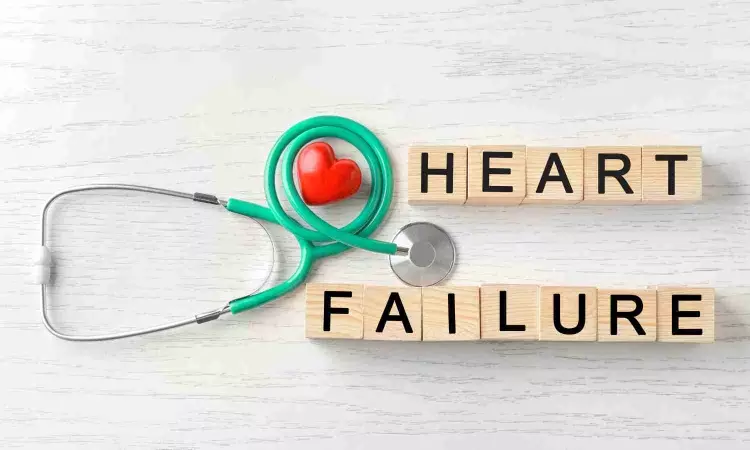- Home
- Medical news & Guidelines
- Anesthesiology
- Cardiology and CTVS
- Critical Care
- Dentistry
- Dermatology
- Diabetes and Endocrinology
- ENT
- Gastroenterology
- Medicine
- Nephrology
- Neurology
- Obstretics-Gynaecology
- Oncology
- Ophthalmology
- Orthopaedics
- Pediatrics-Neonatology
- Psychiatry
- Pulmonology
- Radiology
- Surgery
- Urology
- Laboratory Medicine
- Diet
- Nursing
- Paramedical
- Physiotherapy
- Health news
- Fact Check
- Bone Health Fact Check
- Brain Health Fact Check
- Cancer Related Fact Check
- Child Care Fact Check
- Dental and oral health fact check
- Diabetes and metabolic health fact check
- Diet and Nutrition Fact Check
- Eye and ENT Care Fact Check
- Fitness fact check
- Gut health fact check
- Heart health fact check
- Kidney health fact check
- Medical education fact check
- Men's health fact check
- Respiratory fact check
- Skin and hair care fact check
- Vaccine and Immunization fact check
- Women's health fact check
- AYUSH
- State News
- Andaman and Nicobar Islands
- Andhra Pradesh
- Arunachal Pradesh
- Assam
- Bihar
- Chandigarh
- Chattisgarh
- Dadra and Nagar Haveli
- Daman and Diu
- Delhi
- Goa
- Gujarat
- Haryana
- Himachal Pradesh
- Jammu & Kashmir
- Jharkhand
- Karnataka
- Kerala
- Ladakh
- Lakshadweep
- Madhya Pradesh
- Maharashtra
- Manipur
- Meghalaya
- Mizoram
- Nagaland
- Odisha
- Puducherry
- Punjab
- Rajasthan
- Sikkim
- Tamil Nadu
- Telangana
- Tripura
- Uttar Pradesh
- Uttrakhand
- West Bengal
- Medical Education
- Industry
Finerenone may reduce worsening heart failure and cardiovascular death, finds study, ESC 2024

Finerenone reduced the composite of total first and recurrent heart failure (HF) events (hospitalizations for HF or urgent HF visits) and cardiovascular death in patients with HF and mildly reduced or preserved ejection fraction, according to an international clinical trial led by investigators from Brigham and Women’s Hospital, a founding member of the Mass General Brigham healthcare system.
Heart failure events and cardiovascular death were less common in the finerenone group than in the placebo group. Overall, the rate of serious adverse events was similar across the groups, but rates of hyperkalemia-elevated levels of potassium in the blood-were higher for the group taking finerenone. Results were presented at the European Society of Cardiology Congress 2024 and published simultaneously in the New England Journal of Medicine.
“We saw benefit regardless of the ejection fraction and even in patients who were on other approved therapies,” said trial principal investigator and corresponding author Scott Solomon, MD, the director of the Clinical Trials Outcomes Center at Mass General Brigham and the Edward D. Frohlich Distinguished Chair at Brigham and Women’s Hospital. “This drug represents a new drug class that may become a pillar of therapy for this disease.”
HF is the progressive decline in the heart’s ability to fill with and pump blood. It affects over 60 million people worldwide. Approximately half of all people living with HF have mildly reduced or preserved left ventricular ejection fraction, a condition with limited treatment options. These findings suggest that the non-steroidal mineralocorticoid receptor antagonist finerenone could represent a new therapeutic option for patients.
The FINEARTS-HF trial, funded by Bayer, assigned 6,000 patients to receive either finerenone or placebo in addition to their existing therapies. The trial’s limitations include few Black patients, although the percentage of Black patients was proportional to their regional population. “Our group continues to study novel therapies for heart failure,” Solomon said. “There’s huge residual risk in these patients and so more room for new therapies.“
Reference:
Scott D. Solomon, John J.V. McMurray, Muthiah Vaduganathan, Brian Claggett, Pardeep S. Jhund, Finerenone in Heart Failure with Mildly Reduced or Preserved Ejection Fraction, New England Journal of Medicine, DOI: 10.1056/NEJMoa2407107.
Dr Kamal Kant Kohli-MBBS, DTCD- a chest specialist with more than 30 years of practice and a flair for writing clinical articles, Dr Kamal Kant Kohli joined Medical Dialogues as a Chief Editor of Medical News. Besides writing articles, as an editor, he proofreads and verifies all the medical content published on Medical Dialogues including those coming from journals, studies,medical conferences,guidelines etc. Email: drkohli@medicaldialogues.in. Contact no. 011-43720751


